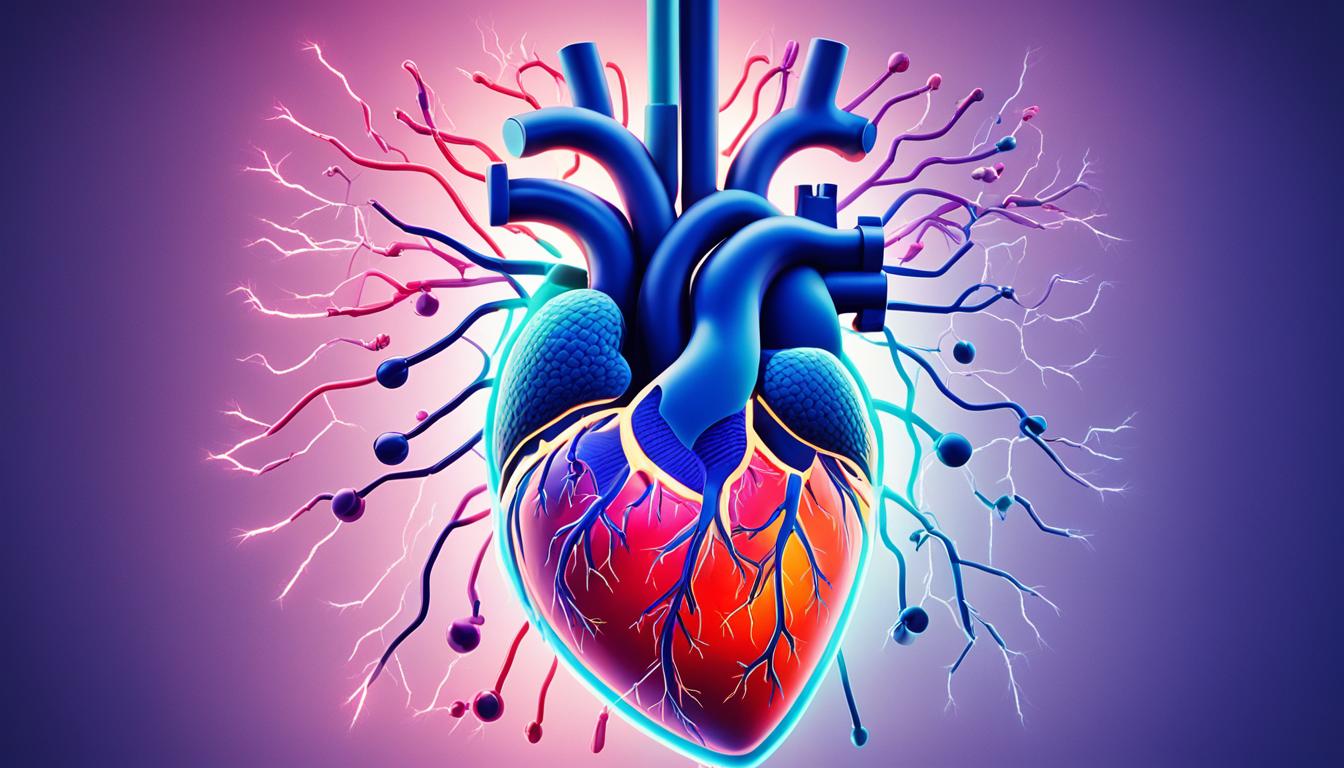Extrasystoles, also called premature heartbeats, disrupt the heart’s rhythm. They lead to irregular heartbeats or ectopic beats. This can cause symptoms like palpitations and an irregular heartbeat. Despite this, extrasystoles in healthy people without heart issues are usually harmless.
They are sorted by where they start, the atria or ventricles. Atrial extrasystoles start in the top heart chambers. Ventricular extrasystoles start in the lower chambers. Diagnosis uses an electrocardiogram (ECG) to find these unusual beats.
Lifestyle adjustments, including less tobacco and alcohol, reducing stress, and staying healthy, could reduce extrasystoles. But in some cases, you might need medicine to fix the arrhythmia. Stem cell therapy, while still new, could be valuable in the future for extrasystole management.
Key Takeaways:
- Extrasystoles are irregular heartbeats that are often safe for those without heart issues.
- Doctors use an electrocardiogram (ECG) to diagnose extrasystoles.
- Treatments like lifestyle changes, medicines, and stem cell therapy are options for extrasystole.
- Less tobacco and alcohol, stress management, and healthy living can make a difference.
- Getting diagnosed early and starting the right treatment is vital for heart health.
Symptoms and Diagnosis of Extrasystole
Extrasystole means your heart beats out of rhythm sometimes. Symptoms can change from person to person. You might feel your heart pounding, have chest pain, find it hard to breathe, or feel dizzy. These signs can be scary. They often lead people to see a doctor. This is to figure out the problem and get the right treatment.
Doctors use an electrocardiogram (ECG) to diagnose extrasystole. This test is simple and It shows your heart’s electrical activity. It can find the early beats that happen in extrasystole. Using an ECG is key to spotting these irregular heart rhythms and confirming what’s going on. Sometimes, doctors also do stress ECGs and echocardiograms. These check your heart’s health and look for any other issues that might cause extrasystole.
Treatment and Prevention of Extrasystole
For some, extrasystole is not a big problem. No treatment might be needed if it doesn’t bother you much. But, improving your lifestyle can still help. This means less smoking and drinking, keeping stress low, and living healthy. Doing these things can make your symptoms better and lower the chances of extrasystoles.
If extrasystole makes you feel bad or if other heart problems are also there, medications could help. These drugs fix the heart rhythm and deal with other health issues. Working with your doctor to choose the best treatment is important.
There’s also stem cell therapy. It’s a new way that might help with extrasystole. This treatment isn’t standard yet. But, it aims to repair the heart and get your heartbeat back to normal. Scientists are still studying to see how safe and well it works for this heart issue.
| Treatment Options | Benefits | Considerations |
|---|---|---|
| Lifestyle Changes | – Reduces symptoms – Promotes overall heart health |
– Requires commitment – May not eliminate extrasystoles completely |
| Medication | – Corrects arrhythmia – Manages underlying conditions |
– Potential side effects – Individual response may vary |
| Stem Cell Therapy | – Potential for tissue regeneration – Restores normal heart rhythm |
– Experimental treatment – Ongoing research and development |
Treatment and Prevention of Extrasystole
The way to treat extrasystole changes based on how often it happens and how serious it is. If they are rare and don’t cause big issues, you might not need treatment. But, changing your lifestyle can be a big help. It supports heart health and keeps extrasystoles in check.
First, cutting back on smoking and drinking is smart. Both can make heart issues worse. Smoking’s chemicals mess with the heart’s electric signals. And too much alcohol can throw off the heart’s beat. Second, keeping cool and managing stress is key. Stress can make extrasystole happen more. Doing activities to relax like working out, meditating, or hobbies can lower stress and cut down on arrhythmia times.
Doctors might also give you medication to fix the arrhythmia and other heart problems. Medicines like beta-blockers, anti-arrhythmics, and calcium channel blockers are common. They help keep your heart’s electricity working right and stop extrasystoles. Always talk to a doctor to get the right diagnosis and treatment.
Researchers see stem cell therapy as a possible way to treat extrasystole. Stem cells can help the heart tissue damaged by the arrhythmia to heal. Even though this therapy’s still new, it looks like it could help your heart work better and keep a normal rhythm.
Right from the start, finding and treating extrasystoles early is best for your heart. Along with medicines and therapies, changing your lifestyle and keeping up with heart care advancements is important. This can help you live well with extrasystole and take care of your heart health.

